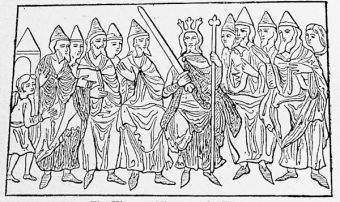@OmSigDAVID,
Omsig wrote: "The title followed bloodlines of inheritance,
the same as it woud if it were a horse, or a gun, or a bag of gold
which was inherited. ....."
Not so. At that time it was evolving from election of warlords to hereditary monarchy.
Vikings/Norsemen were carving up major territories including parts of Northern France (Normandy) and England.
To put it into a reference frame that you may better understand, just imagine a scene from Startrek where a Klingon Warlord died and there was an ensuing battle regarding who was going to be the next Chieftan.
Now, take away the silly make up, the blood pie, and disruptor guns and you basically have England in 1065/66.
The English Crown was not Edward the Confessor's to give away as he liked.
He had long turned his back on the English throne, being a religious nut, and had handed over control to Earl Godwin (his Father-in-law) and son Harold Godwinson (later King Harold).
Edward then had a family tiff with his Father in law and banished him from the country.
It was then that he made the offer to William the Bastard, an offer which would have been totally unofficial, as both men knew that it would have to be ratified by the "Witan" when the time came.
The Godwins returned within a year or so after the family tiff died down, and Edward went back to being a religious nut again.
Harold's brother Tostig buggered off after Northumbria kicked him out, and seeing as Harold didn't back him up, they became sworn enemies. He went off to Vikingland and later, after Edward had died, returned with his mate Hardrada to invade the North of England.
It was this mob who Harold was thrashing when news came of imminent invasion by William on the south coast, hundreds of miles away.
Harold and his knackered forces raced down South to meet them near Hastings.
If he had met them with fresh forces, who knows?
It doesn't change the fact though, that the Witan had met after Edward's death and had agreed on the successor, namely Harold.
The British monarchy is anything but "bloodline hereditary" if you studied it closely enough. Up until pretty recent times (in the European sense) convenient sidesteps were made because of religion or politics of the day.
The hereditary/election situation back in the 10th/11th C : -
From britainexpress:
"On these occasions" (succession) ....."the Witan stands as a survival of the ancient assembly of the tribe in arms; though, as a matter of fact, it had degenerated into an assembly of the magnates and the free population in the neighbourhood where the assembly was held. In all this we can see an absolutely plain evolution from the ancient tribal system as depicted by Tacitus. When joint action was undertaken by the tribes, the war-lord was chosen by the tribal assembly; and the elected war-lord developed by degrees into the hereditary monarch.
The war-lord had his council of the heads of the clans or great family groups within the tribe, who, in the later stage, were displaced by the ealdormen, who were the heads not of clans but of districts, as clan organisation yielded to district organisation; and the organisation of the Church involved the admission of the ecclesiastical heads to this group..."

The king presiding over the Witan, from an 11th century MS. illumination
http://www.britainexpress.com/History/Witan.htm